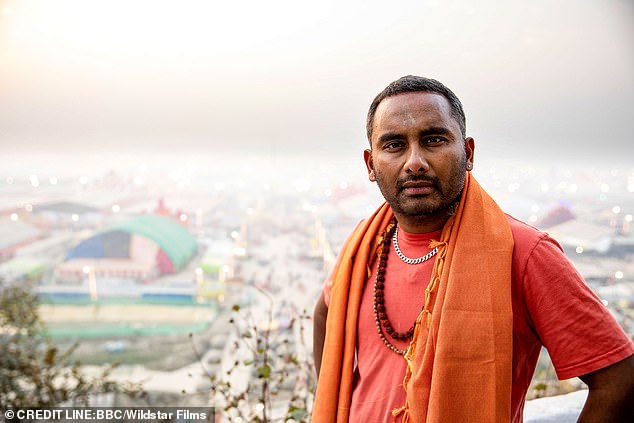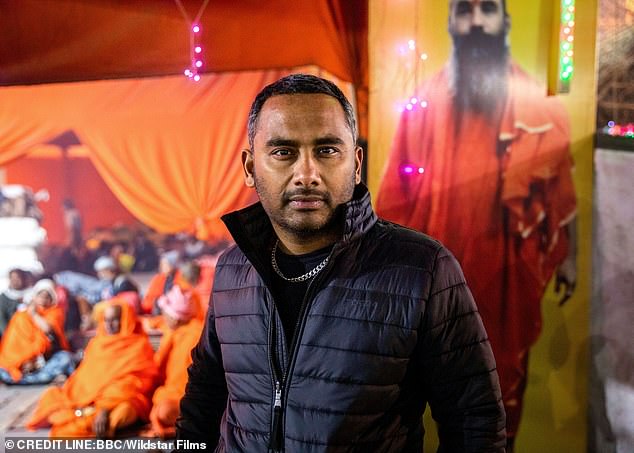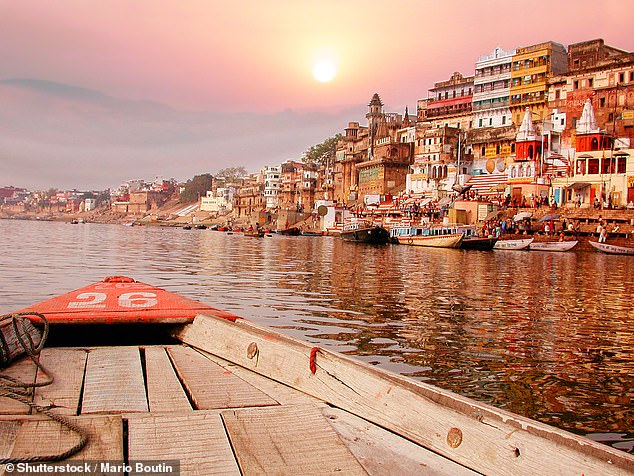Amol Rajan Goes To The Ganges (BBC1)
Television people famously worry about working with children and animals. But that’s nothing compared with the dangers of a presenter’s mum loose in front of the camera.
Minutes into Amol Rajan Goes To The Ganges (BBC1), his mother was gleefully recalling: ‘You were very chubby, Amol. Pleasantly plump, I would say.’ Thanks, Mum.
As a child, Amol’s role models were all white: people like cricketer Shane Warne and philosopher Bertrand Russell. (Oh come on, which teenager doesn’t have a picture of Bertrand on their bedroom wall?)
The only Indian who inspired him was his father, a bank official who died three years ago. Since then, the Radio 4 Today presenter and University Challenge host hasn’t been quite the same: ‘I’ve been in a bit of a funk.’
In part to heal his grief, but mainly because the BBC suggested it, Amol flew to India to attend the Hindu festival of Kumbh Mela, a huge gathering of pilgrims on the banks of the Ganges.
And I mean huge. During one day, around 70 million people — roughly the population of the UK — squeezed into just 15 square miles.

As a child, Amol’s role models were all white: people like cricketer Shane Warne and philosopher Bertrand Russell. Pictured: Amol Rajan

The idea was that Amol would join pilgrims in bathing in the sacred river. He would connect with his religious heritage, even though he describes himself as an atheist, and somehow heal his grief
They included what is surely the world’s largest collection of thin, old men with very long beards. Not to mention sacred warriors, naked apart from a coating of ash, and lots of people dressed in orange, which represents fire.
As Amol pushed his way through crowds, he was greeted with shouts of ‘Praise be to the Lord Ram!’ and ‘Victory to Lord Shiva’. It was like watching a good-natured football crowd heading for the world’s biggest cup final.
The idea was that Amol would join pilgrims in bathing in the sacred river. He would connect with his religious heritage, even though he describes himself as an atheist, and somehow heal his grief.
Unfortunately, events got in the way. He and his party were stopped before they could reach the holiest point of the river, the confluence of the Ganges and the Yamuna river.
There had been a stampede, just 800m away. Ninety people were injured, and 30 were killed.
So Amol had to improvise.
This might sound odd if you’re not a Hindu, but he took part in a ceremony in which oatmeal balls represented the souls of his ancestors.

As Amol pushed his way through crowds, he was greeted with shouts of ‘Praise be to the Lord Ram!’. Pictured: The sunset river bank on the ganges in India on an old wooden boat.
He mixed the balls into a mash, and took this to the river. ‘I am now going to release the sacred oatmeal into the water,’ he said solemnly.
In the river, he ritually released his father’s soul before immersing himself in the water. ‘I’m as high as a kite,’ he admitted. ‘I can feel the cosmic energy flowing through me right now.’
It was rather moving, but I couldn’t help thinking that if anybody had told tough-talking interviewer Amol that they were full of cosmic energy, he would have rolled his eyes to camera.












